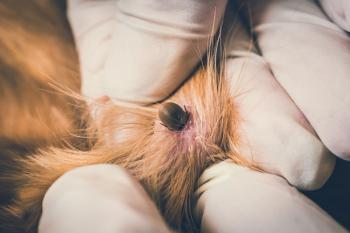
Lyme disease reports three times higher than normal in Maine
National Report - Cases of Lyme diesease are on the rise in Maine.
NATIONAL REPORT — Cases of Lyme disease are on the rise in Maine.
In fact, the rate of confirmed cases of Lyme disease reported to the Maine Center for Disease Control and Prevention (CDC) is three times higher than normal. Fifty human cases of Lyme disease in Maine were reported to the CDC in January and February, compared with an average of 15 for those months during the previous five years, according to the Portland Press Herald in April.
Dr. Donald Hoenig, Maine's state veterinarian in the department of agriculture, and former mixed-animal veterinarian, confirms that Lyme disease is certainly on the increase. There were 970 confirmed cases in humans in 2009; 908 in 2008; 529 in 2007.
Contributing factors
Charles Lubelczyk, biologist at the Vector-Borne Disease Lab of the Maine Medical Center Research Institute in South Portland Maine, says increases in Lyme disease can be directly linked to an increase in the tick that transmits the disease, Ixodes scapularis, or the black-legged or deer tick.
"Increase in deer ticks have occurred for a couple of reasons: a) an increase in white-tailed deer numbers, which the ticks need to feed on to lay their eggs, b) a gradual but steady change in the landscape from agriculture to forests over the last century," Lubelczyk explains.
For Hoenig, an avid runner who has lived on the mid-coast of Maine for the past 27 years, he's observed how deer ticks are increasing in geographic distribution. "When I moved here in the early 1980s, there were no ticks on my property in the woods. Over the past five to seven years, deer ticks and dog ticks have moved into my area — not only on my dog, but on myself when I've run in the woods."
Weather also may contribute to the rise in cases. "Generally, we have snow on the ground through March throughout Maine," Hoenig says. "This season we didn't have any snowstorms in most of the state during March. I was removing ticks from my dog during the first week of March. Last year, the last tick I pulled off my dog was Dec. 1. We had only a three-month period where we didn't have ticks." Another factor contributing to the increase in Lyme disease is because most pet owners stop administering flea-and-tick treatments during the winter months, says Sandra Mitchell, DVM, Dipl. ABVP, at Animal Medical Associates in Saco, Maine.
"This may leave unvaccinated pets completely exposed to Lyme disease," she says.
Getting the word out
Educating the public can go far in preventing future Lyme disease cases, according to experts.
Teams from Lubelczyk's vector-borne disease lab, along with epidemiologists from the Maine CDC, give public addresses on the risks of ticks and tick-borne diseases year-round. The state and the vector-borne laboratory also maintain Web sites on Lyme disease and distribute print education materials for the public, physicians and veterinarians.
The vector-borne work group, a public/private cross-agency committee that meets quarterly to develop strategies for vector-borne disease, also has developed tick identification cards and other educational materials, according to Hoenig. An educational subgroup of that vector-borne work group has developed curriculum for grade-school children to educate them on Lyme disease.
At Mitchell's practice, staff sends out regular newsletters informing clients of the risks of tick-borne diseases. "Also, we spend a significant amount of staff time discussing tick-control options, vaccine options and other environmental control mechanisms to help prevent tick-borne diseases in pets," Mitchell says.
Ms. Skernivitz is a freelance journalist in Cleveland, Ohio.
Newsletter
From exam room tips to practice management insights, get trusted veterinary news delivered straight to your inbox—subscribe to dvm360.




